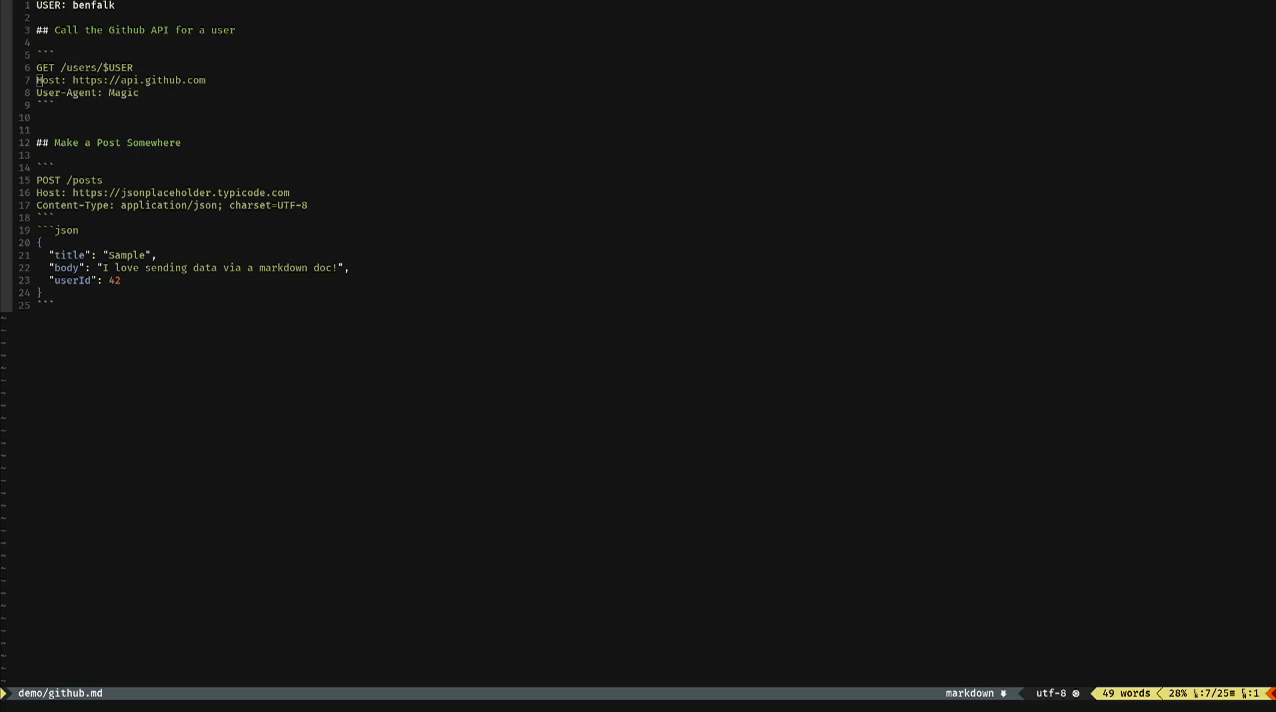Converts a request formatted with a markdown format into a http request.
For instance the following are valid req_md markdown requests:
Note: the json part of the code block is only for display and linting
of the markdown for readers, it is completely ignored by req_md.
POST /widgets
Content-Type: application/json
Host: localhost:3000
{
"name": "foo",
"type": "mark-1",
"series": 8
}GET /filter
?zip=90210
&radius=50
&colors=red,white,blue
Host: localhost:8080
GET /lifetimes
Content-Type: application/json
X-All-The-Things: it can be whatever here really
R-You-Using-This: again, it can be anything here
Host: localhost:8081
Any normal line that starts with VAR: converts the remaining of the line
into a variable. Any references to these made as $VAR in your request are
expanded to the value on the right hand side value of the colon. This is a
new and experimental feature that I'm sure has bugs...
It also will attempt to use environment variables as well as any .env file
it finds in the current working directory or any subsequent parent directory
of the current working directory.
For reference see samples/requests-with-variables.md
(c) Works on my machine
req_md works by either a given filename or a piped in string of markdown.
If a filename is given it will ignore any input that is piped from std-in.
Using the file found in samples/multiple-requests.md as a reference, if
you want to call the second request found in the markdown here are both
examples:
cat samples/multiple-requests.md | req_md --line=11
req_md samples/multiple-requests.md:11If you omit the line to use it will run the first valid request it finds.
You can get a debug representation of the request that is going to be run
without running it by supplying the list-requests flag. Here if you
ommit the line number it will output to std-out all of the valid requests
it finds.
NOTE: Currently you must include a rather clunky Host: header so that
req_md knows where to send it's request. Without it the markdown currently
is not counted as valid markdown.
You can set a timeout in milliseconds, seconds, or minutes in the format following the examples below:
--timeout=300ms
--timeout=15sec
--timeout=2min
This is how I use it with Neovim; I may one day actually spend some time
making it "real" plugin. Note that mine is expecting the output to always
be JSON and I use jq with it. Also, req_md needs to be in your path
with this example.
function! ReqMd()
let l:filename = expand('%')
let l:line_number = line('.')
let l:arg = l:filename . ":" . l:line_number
let l:output = system('req_md --output=markdown ' . l:arg)
vnew
call append(0, l:output)
execute '%s/\%x00/\r/g'
execute 'g/^$/d'
normal gg
set filetype=markdown
set buftype=nofile
set noswapfile
endfunction
map <leader>rr :call ReqMd()<cr>- Custom Timeouts
- Custom Pretty Output Formatters
- Markdown with JSON
- Markdown with (xyz format)
- dotfile Config
- Variables Support
- Harden Variables Support
- Dotenv and ENV Variable Support
- Session / Cookie
- Multiple Requests
